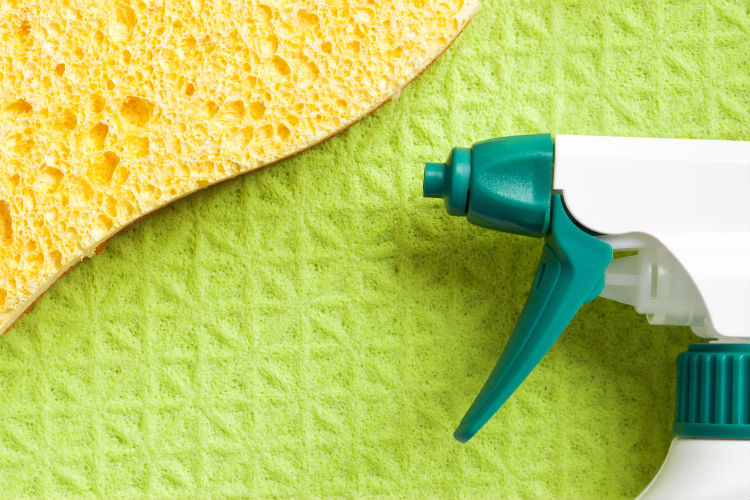Caregivers do everything they can to protect seniors from falling ill, but six overlooked everyday objects can have serious health effects. Use the following tips to minimize bacteria, viruses and allergens in your home and keep you and your loved ones happy and healthy.
Sponges
These items are meant to help us clean, but in reality, sponges are among the dirtiest objects in the home. Wet sponges are an ideal breeding ground for bacteria. When you wash dishes or wipe down the kitchen counter with a sponge, E. coli and salmonella are spread all over these surfaces, which can result in food-borne illnesses.
Instead, use paper towels or dishcloths that can be laundered frequently and a mix of bleach and water to wipe down kitchen surfaces. To keep your kitchen sponge from becoming bacteria-laden, get in the habit of squeezing water out of it between uses and sanitizing it regularly. You can do this by saturating the sponge and microwaving it for one minute, placing it in the dishwasher, or dunking it in a 1:9 ratio of bleach to water. Replacing sponges regularly is crucial. A good rule of thumb is to toss your sponge out if it has any odor.
Vacuums
Vacuuming is touted as an effective way to reduce the level of airborne allergens in the home. However, dust mites, pollen, pet dander and other allergens are not effectively contained in an average vacuum filter. These irritants are thrown back into the air and can continue to cause discomfort for you and your family. To avoid this, look for a vacuum that has a HEPA (high-efficiency particulate air) or S-class filter. These extra-fine filters can trap up to 99.9% of super fine particles, effectively reducing the pollutants in your home.
Pillows
Do you know what is resting on your pillow besides your head? Dust mites: the most common cause of non-seasonal allergies and asthma. Dust mites feed on flakes of human skin, which can accumulate deep within your pillows. To reduce the buildup of dust and dust mites and lessen their effects, wash pillowcases at least every three weeks, use zippered, allergen-proof covers underneath the cases, and wash the actual pillows every few months. A warm cycle in the washing machine can get rid of dust mites and debris in down-alternative pillows. Most pillows only have a lifespan of about one or two years, so be sure to replace them once they get soiled. Don't forget the throw pillows in your living areas as well.
Doorknobs
Bacteria and viruses can survive on doorknobs and other hard surfaces for hours. To minimize exposure, you can keep doors open or tape the latches open to reduce the need to touch doorknobs. If that isn’t realistic, use a product that is registered with the environmental protection agency (EPA) to clean knobs regularly. These cleaning products undergo a review process to certify they are effective against any pathogens listed on their labels, such as strep and staph bacteria and cold and flu viruses. Be sure to follow the instructions on the product you choose to ensure it effectively sanitizes. For example, the solution in a Clorox disinfecting wipe must sit on a surface for approximately four minutes and air dry in order for it to be effective. Good hand-washing habits are crucial for preventing the spread of germs as well.
TV Remotes
Everyone in the house probably handles the living room television remote. It’s been coughed and sneezed on, dropped on the floor and had food spilled on it, but it probably isn’t a part of your regular cleaning routine. A weekly wipe down with a cloth or cotton ball dipped in rubbing alcohol will make it a bit more sanitary. Opt for a smaller instrument like a cotton swab to help you clean between the buttons. This method works well on grimy home telephones as well.
Fragrances and Perfumes
While viruses and bacteria are often considered public enemy number one, allergens can take a toll on our bodies as well. Indoor allergy triggers can contribute to skin irritation, respiratory symptoms and itchy, watery eyes. One of the biggest culprits in the home is fragrances. Scents are added to everything from personal care products to household cleaners, but it is important to remember that cleanliness is not tied to a specific smell.
To reduce the chemicals and allergens in your home, avoid burning scented candles, using fragrance diffusers or spraying air-fresheners. Look for cleaning products that are labeled “free and clear” and do not have fragrance listed as an ingredient. In addition, try going perfume-free for a few days and see if that helps you and your loved one breathe easier.
It is impossible to keep your home completely free of allergens, bacteria and viruses, but a few simple changes around the house can make a significant difference.
